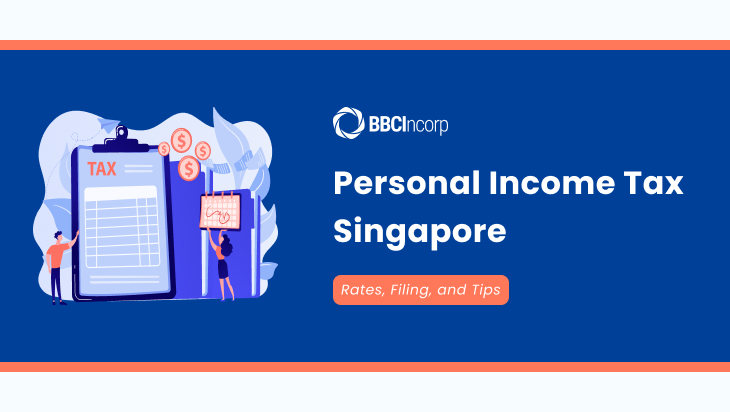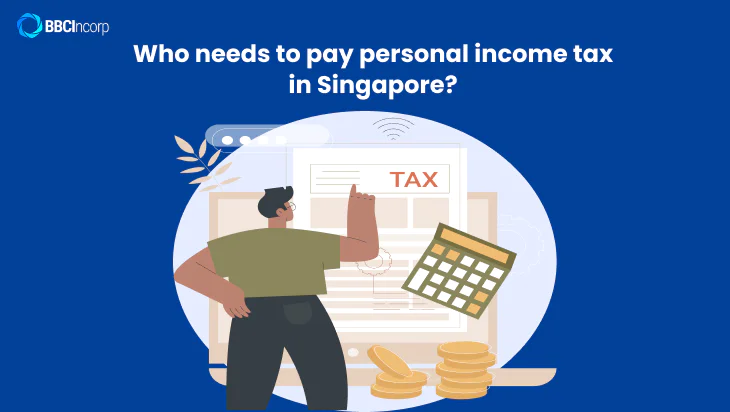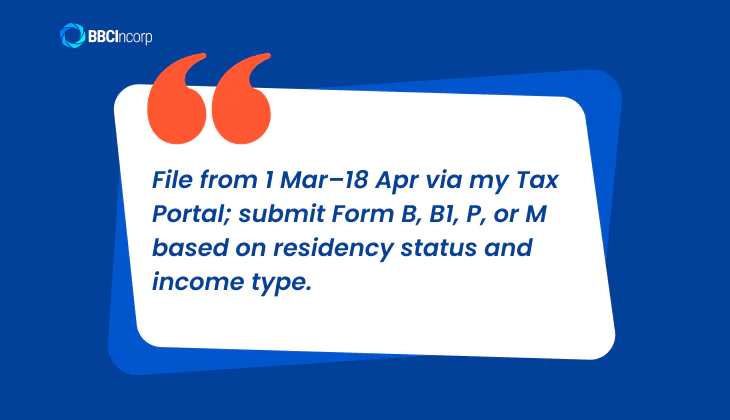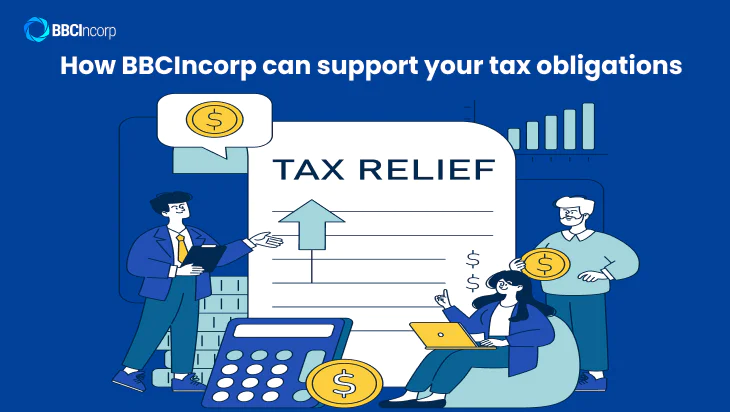
Personal income tax in Singapore is a key responsibility for individuals earning income within the country. A clear understanding of residency status, applicable tax rates, reliefs, and filing requirements is essential, as these elements directly shape one’s tax liability and compliance obligations.
For the Year of Assessment (YA) 2025, notable updates include adjustments to certain relief schemes and the introduction of a one-off tax rebate to ease the burden on residents. These changes highlight the government’s ongoing commitment to ensuring a fair and supportive tax framework. Recognized for its progressive yet competitive system, Singapore continues to attract foreign professionals and entrepreneurs seeking a stable and low-tax jurisdiction.
This article provides an overview of the personal income tax regime and practical guidance to help taxpayers meet their obligations with confidence.
Who needs to pay personal income tax in Singapore?
Understanding who is liable to pay personal income tax in Singapore is the first step toward compliance with the country’s tax regulations. Tax obligations are determined by residency status and the nature of income earned, both of which play a critical role in defining one’s tax liability. By distinguishing between resident and non-resident taxpayers and identifying what types of income are taxable, individuals can better assess their responsibilities under Singapore’s personal tax framework.

Resident vs. non-resident taxpayers
Tax residency status determines how an individual is assessed for personal income tax in Singapore. A person is considered a tax resident if they stay in Singapore for at least 183 days in a calendar year or have established a permanent home in the country. Those who do not meet these criteria are treated as non-residents.
Residency status directly impacts both the tax rates applied and the eligibility for personal reliefs and deductions. Residents are taxed under a progressive system and may claim various reliefs, while non-residents are generally subject to flat tax rates and are not entitled to most reliefs.
To establish residency, the Inland Revenue Authority of Singapore (IRAS) uses the tax residency test. For compliance and reporting, relevant forms such as Form IR8A (for employment income) and Form IR21 (for foreigners leaving Singapore) must be filed accurately.
Types of taxable income
For the purposes of personal tax Singapore, taxable income is classified into several key categories. Employment income includes salaries, bonuses, allowances, and stock options received from an employer. Self-employment income applies to freelancers, sole proprietors, and gig workers, where tax is assessed on the net profits of their trade or profession.
In addition, other income may be subject to tax, such as rental earnings, director’s fees, and certain foreign-sourced income that is brought into Singapore.
Additionally, some income is exempt from Singapore personal tax, including CPF contributions and dividends from Singapore-resident companies. Understanding the difference between taxable income and exempt income is important to ensure accurate declaration and compliance.
Singapore personal income tax rates and structure
Singapore’s personal income tax framework is built on principles of equity and simplicity, ensuring that tax contributions reflect both income levels and residency status. To fully understand one’s obligations, it is important to examine the current tax rates for residents and non-residents for the Year of Assessment 2025, as well as the method by which chargeable income is calculated after reliefs and deductions.
Current tax rates for residents and non-residents (YA 2025)
Tax residency is the determining factor in how individual income is assessed under Singapore’s tax framework. Resident taxpayers are subject to a progressive system, where income is taxed in tiers and higher earnings attract higher rates, ensuring that contributions are proportionate to one’s capacity.
For the Year of Assessment (YA) 2025, the Inland Revenue Authority of Singapore (IRAS) continues to apply the same progressive tax rates as in YA 2024, with resident individuals taxed according to the following brackets:
| Taxable income (SG$) | Year of assessment 2025 onwards | ||
| Over (column 1) | Not over | Tax on column 1 (SG$) | Percentage on excess (%) |
| 0 | 20,000 | – | – |
| 20,000 | 30,000 | – | 2 |
| 30,000 | 40,000 | 200 | 3.5 |
| 40,000 | 80,000 | 550 | 7 |
| 80,000 | 120,000 | 3,350 | 11.5 |
| 120,000 | 160,000 | 7,950 | 15 |
| 160,000 | 200,000 | 13,950 | 18 |
| 200,000 | 240,000 | 21,150 | 19 |
| 240,000 | 280,000 | 28,750 | 19.5 |
| 280,000 | 320,000 | 36,550 | 20 |
| 320,000 | 500,000 | 44,550 | 22 |
| 500,000 | 1,000,000 | 84,150 | 23 |
| 1,000,000 | 199,150 | 24 | |
Resident taxpayers benefit from progressive tax rates ranging from 0% to 24% (for YA 2025). They are eligible for various reliefs and deductions, which help reduce their overall tax burden under the Singapore personal income tax framework.
In contrast, non-residents are taxed on their employment income at a flat rate of 15% or at the progressive resident rates, whichever is greater. They are not eligible for the same personal reliefs available to residents. For director’s fees, consultant’s fees, and other similar Singapore-sourced income, IRAS imposes a flat tax rate of 24%.
How tax is calculated on chargeable income
The computation of chargeable income in Singapore follows a clear framework. Chargeable income is defined as an individual’s total assessable income minus allowable reliefs and deductions. These reliefs, such as spouse relief, parent relief, or CPF contributions, help reduce the taxable amount, thereby lowering the overall tax liability.
Singapore applies a progressive tax system for residents, meaning income is taxed in tiers: lower income levels are taxed at lower rates, while higher earnings attract higher rates. This ensures a fair distribution of the tax burden across different income groups.
For example, consider an individual with a chargeable income of SG$100,000. The tax is computed progressively as follows:
| Income Bracket (SG$) | Tax Rate | Tax Amount (SG$) |
| First 20,000 | 0% | 0 |
| Next 10,000 | 2.00% | 200 |
| Next 10,000 | 3.50% | 350 |
| Next 40,000 | 7.00% | 2,800 |
| Remaining 20,000 | 11.50% | 2,300 |
| Total Tax Payable | 5,650 | |
By understanding how chargeable income is computed and applying the correct progressive rates, taxpayers can accurately plan their obligations and make informed financial decisions.
Deductions, reliefs, and rebates available
Singapore’s personal income tax framework is designed not only to generate revenue but also to encourage positive social and economic behaviors.
To achieve this, the Inland Revenue Authority of Singapore (IRAS) provides a range of deductions, reliefs, and rebates that help reduce the overall tax burden for individuals. These provisions are particularly relevant for taxpayers who are supporting families, pursuing professional development, or running their own businesses.
In this section, we examine the most common forms of tax reliefs, allowable deductions for business and self-employed income, and personal tax rebates available to eligible individuals.

Common tax reliefs for individuals
Singapore offers a range of personal income tax reliefs designed to ease tax burdens and promote social goals. Course Fees Relief (up to SG$5,500 each year) supports lifelong learning, while NSman Relief honours national service. Working individuals also benefit from Earned Income Relief and CPF Relief, which encourage employment and retirement savings.
For families, the Qualifying Child Relief (QCR) provides SG$4,000 per child, and the Working Mother’s Child Relief (WMCR) grants fixed amounts of SG$8,000, SG$10,000, and SG$12,000 for the first, second, and subsequent children from YA 2025. These measures highlight support for parenthood and working mothers.
Overall, the total claimable relief is capped at SG$80,000 per YA, ensuring equitable treatment across taxpayers.
Deductions for business and self-employed income
For self-employed individuals and business owners, tax is assessed on net trade income, meaning gross earnings after deducting allowable business expenses. Only expenses that are wholly and exclusively incurred for income generation, such as office rent, staff salaries, or business supplies, are deductible. By contrast, personal or capital expenses (e.g. private travel, fines, or non-business entertainment) are disallowed (IRAS).
To ease compliance, small businesses with an annual revenue of SG$200,000 or below may file using the simplified 2-line statement, declaring only revenue and adjusted profit instead of detailed accounts (IRAS). This framework not only reduces administrative work but also ensures clarity in reporting under Singapore’s personal income tax system.
Personal tax rebates
Beyond deductions and reliefs, Singapore also provides personal tax rebates, which directly reduce the amount of tax payable rather than just lowering chargeable income. A key example is the Parenthood Tax Rebate (PTR), designed to encourage and support family formation by granting significant savings to parents of Singaporean children. The rebate amount varies depending on the number of children and can be apportioned between spouses, offering meaningful long-term financial relief.
In addition to these ongoing measures, the Year of Assessment 2025 introduces a notable one-off rebate: all resident taxpayers are entitled to a 60% personal income tax rebate, capped at SG$200. Announced as part of the SG60 initiatives, this exceptional measure reflects the government’s commitment to easing tax pressures on households during a milestone year.
Unlike reliefs, which adjust taxable income, rebates are subtracted directly from the tax payable. This makes them one of the most effective instruments in reducing overall liabilities, and the special rebate in YA 2025 stands out as a unique benefit within Singapore’s consistently competitive tax regime
Filing personal income tax in Singapore
Meeting filing requirements is an essential component of compliance with personal income tax in Singapore. Individuals are responsible for ensuring that their income, deductions, and relief claims are accurately reported to the IRAS.
While the introduction of digital services such as the myTax Portal has streamlined the process, taxpayers must remain attentive to filing periods, required forms, and potential penalties for non-compliance. This section outlines when and how to file your tax return, as well as the implications of late or inaccurate submissions.
When and how to file your tax return
The filing season typically runs from 1 March to 18 April each year. During this period, individuals are required to submit their returns electronically via the myTax Portal. Depending on their residency status and type of income, taxpayers must complete Form B/B1/P/M.
For many employees, the Auto-Inclusion Scheme (AIS) provides added convenience, as participating employers automatically submit income information to IRAS. However, it remains the taxpayer’s responsibility to review all pre-filled details carefully to avoid errors. Adhering to the prescribed filing window is crucial to ensure compliance with obligations under the filing personal income tax Singapore framework.

Penalties for late filing or incorrect returns
Under the framework of personal income tax Singapore, the Inland Revenue Authority of Singapore (IRAS) enforces strict penalties to maintain fairness and deter non-compliance. These penalties are applied not only to encourage timely filing and payment but also to ensure that individuals take responsibility for the accuracy of their tax declarations. Consequences can range from estimated assessments and fines to significant financial penalties and even prosecution in severe cases.
The table below summarises the key implications for late filing, late payment, and submission of incorrect returns, together with the relief measures available through the Voluntary Disclosure Programme (VDP):
| Type of Non-Compliance | Consequence / Penalty |
| Late Filing | Estimated Notice of Assessment (NOA), composition fine up to S$5,000, or court summons. |
| Late Payment | 5% penalty on unpaid tax; additional 1% per month thereafter (capped at 12%). |
| Incorrect Returns | Recovery of undercharged tax; penalties up to 200% of tax underpaid; possible prosecution. |
| Voluntary Disclosure (VDP) | Full waiver if disclosed within 1 year; thereafter reduced penalty (5% per year of underpaid tax). |
These rules highlight that timely and accurate compliance with personal tax Singapore requirements is not only a legal obligation but also a practical safeguard against substantial financial consequences.
At the same time, the VDP serves as a constructive mechanism, offering taxpayers an opportunity to voluntarily rectify errors with reduced penalties, encouraging transparency and reinforcing trust in the tax system.
Tools and tips to calculate your taxes accurately
Accurate tax calculations are critical to meeting personal income tax Singapore obligations and ensuring correct tax payments. Fortunately, the Inland Revenue Authority of Singapore provides a user-friendly Singapore personal income tax calculator that simplifies this process. Paired with strategic tax planning, such as timing of contributions and income recognition, this allows taxpayers to optimize their tax position with confidence.
Using the IRAS tax calculator
IRAS offers an official personal income tax calculator accessible via their website, designed to help tax residents estimate their tax liability. Taxpayers need to input relevant data, such as total income, reliefs claimed (e.g., CPF contributions, course fees, parenthood reliefs), and deductions, then the calculator applies the appropriate progressive tax rates (or flat rates for non-residents) to provide a reliable estimate of tax payable.
While the calculator does not replace the official Notice of Assessment (NOA), it serves as an essential planning tool for individuals seeking to understand their financial responsibilities in advance. It enables taxpayers to evaluate how different reliefs or deductions impact their final liability, make more informed decisions regarding tax planning strategies, and verify the accuracy of their tax position before filing.
For both first-time filers and seasoned taxpayers, the Singapore personal income tax calculator is a practical resource that enhances compliance and supports proactive financial management.
Tax planning strategies to reduce liabilities
Beyond using the calculator, proactive strategies can significantly lower one’s personal tax Singapore liability:
- Maximize reliefs by making voluntary CPF top-ups or Supplementary Retirement Scheme (SRS) contributions, both of which qualify for tax deductions and are reflected in the tax calculator input.
- Optimize income timing, such as deferring or accelerating bonus payments, choosing when to declare rental income, or timing deductible business expenses to align with lower marginal tax brackets, ultimately reducing taxable chargeable income and improving efficiency under the personal tax rate Singapore system.
Together, these tools and strategies enable taxpayers to estimate their liabilities accurately and take informed steps to mitigate them. Using the personal income tax calculator alongside smart planning offers both clarity and tax savings.
How BBCIncorp can support your tax obligations
Meeting tax obligations in Singapore can be complex, particularly for expatriates, entrepreneurs, and individuals with cross-border income. BBCIncorp provides tailored solutions that simplify the process while ensuring full compliance with IRAS requirements.
Our dedicated tax professionals combine technical expertise with digital tools to help clients manage personal income tax responsibilities in Singapore with confidence.

Personal tax advisory and tax filing services
BCI provides comprehensive support for filing personal income tax in Singapore, from initial income assessment to submission of returns with IRAS. Our advisors guide clients through residency classification, relief eligibility, and deductions, ensuring every aspect of their tax position is accurately reflected.
For expatriates, entrepreneurs, and business owners, we deliver end-to-end assistance that includes optimizing relief claims and mitigating unnecessary liabilities, making personal income tax Singapore compliance straightforward and stress-free.
Cross-border tax structuring and digital tools
For clients with regional or international income streams, effective tax structuring is critical. BBCIncorp provides cross-border advisory services to help optimize personal income tax outcomes and reduce exposure to double taxation risks.
Beyond traditional consulting, our secure digital client portal enables seamless document management, real-time updates, and direct access to tax specialists across Southeast Asia. This integrated approach ensures that both domestic and overseas tax matters are addressed in a coordinated and efficient manner.
Get personalized tax support from BBCIncorp. Contact our Singapore tax team today to simplify your 2025 income tax season.
Conclusion
Understanding personal income tax Singapore is essential for every individual earning income in the country. Knowing who is liable, how chargeable income is calculated, and why accurate filing matters helps taxpayers remain compliant while avoiding unnecessary penalties.
Singapore continues to stand out as an attractive low-tax jurisdiction, with its progressive structure, wide range of reliefs, and transparent framework that supports both residents and expatriates.
By taking advantage of available reliefs and leveraging tools such as the official Singapore personal income tax calculator, individuals can optimize their tax position more effectively.
Whether you are an individual, an expatriate professional, or a growing business, BBCIncorp delivers end-to-end tax solutions tailored to your needs. From personal income tax filing to cross-border structuring and corporate compliance, our expertise ensures accuracy, efficiency, and full alignment with Singapore’s regulatory standards. Please contact BBCIncorp via service@bbcincorp.com for timely support!
Frequently Asked Questions
Do I need to file if I earned less than S$22,000?
Individuals with annual income below S$22,000 generally do not have to pay tax, as this is the tax exemption threshold. However, this does not always exempt you from filing a return. If IRAS issues you a Notice of Assessment (NOA) or a filing instruction, you are legally required to submit your return. In addition, those under the No-Filing Service (NFS) should still review pre-filled details to ensure accuracy.
What happens if I’m leaving Singapore for good?
Tax obligations differ depending on whether you are a Singapore Citizen, Permanent Resident (PR), or a foreign employee:
- Singapore Citizens and Permanent Residents (PRs):
If you are permanently leaving Singapore, you remain liable to report and settle your final year of assessment. IRAS will continue to treat you as a tax resident for the year of departure, and you must file your last income tax return and clear any outstanding liabilities before leaving. Failure to do so may result in penalties or enforcement action.
- Foreign Employees (Non-Citizens):
When leaving Singapore for good, you are subject to a tax clearance process. Your employer is required to file Form IR21 at least one month before your employment ends or before you depart from Singapore. Employers must also withhold all pending payments (salary, bonuses, allowances) until IRAS issues a clearance directive confirming that your tax obligations are fully settled.
How can I check my tax balance or payment status?
You can check their personal income tax Singapore balance and payment status via the myTax Portal, using Singpass to view their Notice of Assessment (NOA) and outstanding amounts. Payments can be made through GIRO installments, internet banking, AXS stations, or approved credit card channels, with GIRO offering the convenience of automatic deductions.
How is foreign-sourced income treated for tax purposes?
Generally, overseas income received in Singapore, including overseas income deposited into a Singapore bank account, is not taxable. You do not need to declare overseas income that is not taxable.
Disclaimer: While BBCIncorp strives to make the information on this website as timely and accurate as possible, the information itself is for reference purposes only. You should not substitute the information provided in this article for competent legal advice. Feel free to contact BBCIncorp’s customer services for advice on your specific cases.
Industry News & Insights
Get helpful tips and info from our newsletter!
Stay in the know and be empowered with our strategic how-tos, resources, and guidelines.





